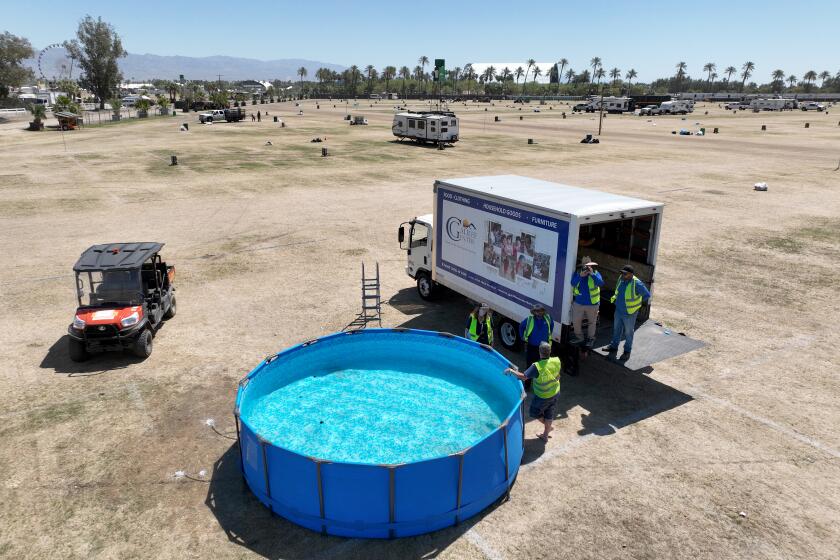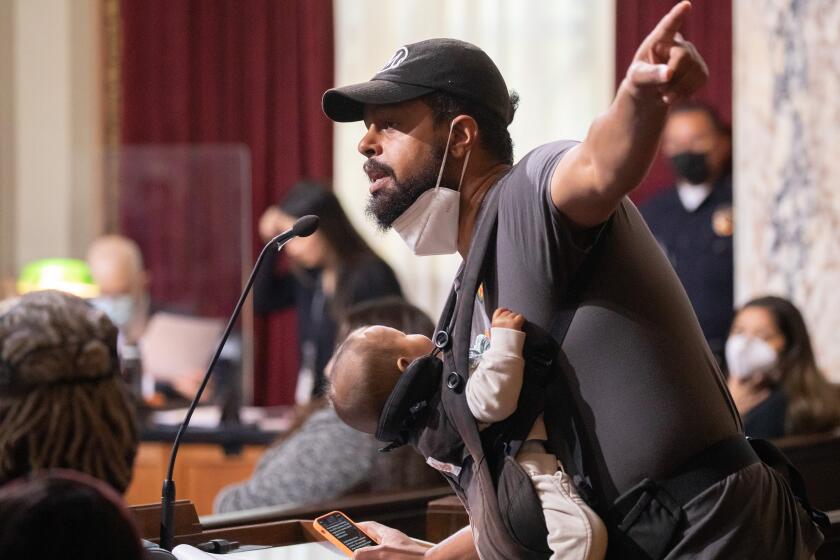Judge Orders Driver Tried for Murder in Four Crash Deaths
Michael Reding, whose high-speed driving while he was intoxicated resulted in the deaths of a Fullerton woman and her three children last fall, said Tuesday he shouldn’t be tried for murder because “I never meant to hurt anybody.”
Municipal Judge Dave Bach Jr., who called Reding “a nice man,” said he sympathized with Reding’s view. Nevertheless, Bach ordered Reding to stand trial on four counts of second-degree murder.
Bach told attorneys at a preliminary hearing Tuesday that “most of us, judges and lawyers even, have gotten behind the wheel after drinking more than we should.
“A fraction of a second and a little luck, there but for the grace of God go I,” Bach said. “That’s the only difference between Mr. Reding and the rest of us. . . .
“A lot of nice people end up going to prison for killing other nice people,” he added. “If that seems hard, so be it.”
A state Supreme Court decision three years ago allows prosecutors to file second-degree murder charges in vehicular fatality cases. But in a half-dozen such cases since then, the Orange County district attorney’s office has yet to win a murder conviction.
Bach said from the bench that the district attorney’s office would have an uphill fight getting a murder conviction in this case, too. But it was a jury’s right to decide, not his, Bach said.
Reding, 26, of Fullerton, was arrested Oct. 23, 1984, after he swerved into oncoming traffic on State College Boulevard in Fullerton and collided with a car driven by Pamela Trueblood, 36.
Trueblood and her children, Scott, 8, Kerry, 9, and Eric, 11, were killed in the crash. Two other children in the car, Brian Rector, 12, and Shawn Ratcliff, 2, survived injuries in the accident.
Reding has admitted that he was passing cars on a dirt shoulder on the right side of State College Boulevard shortly before the collision occurred. His blood alcohol level was 0.108, slightly above the 0.10 level that is the minimum for conviction on drunk driving.
Reding’s attorneys, acknowledging that Reding was drunk and was driving at a high rate of speed, told the judge they had difficulty arguing against four counts of vehicular manslaughter.
But his crime, they argued, was no more than gross negligence (the criterion for vehicular manslaughter), not wanton disregard for human life (the criterion for second-degree murder).
But Bach agreed with Deputy Dist. Atty. Mike Jacobs that Reding had two strikes against him:
- The bartender at the Laredo Bar in Brea, where Reding had come from just before the collision, testified that he cut Reding off from any more drinking and asked him to leave. Reding should have been aware then that he might have had too much to drink to drive safely, the judge said.
- The 0.108 blood alcohol content was low enough to indicate Reding was not too drunk to be aware that his driving was unsafe.
Reding’s attorneys also say their client is “extremely remorseful.”
“You talk about victims, sometimes you have to include defendants in that,” said one of his attorneys, David Haigh.
‘He’s a Basket Case’
Haigh said Reding lost his job in the computer engineering section of the Northrop Corp. following the incident, and that “mentally, he’s a basket case over what’s happened.”
Reding is free on $500,000 property bond posted by his family and friends.
After the hearing, Reding said he was disappointed with Bach’s decision because he did not consider himself guilty of murder.
“I never meant to hurt anybody,” he said.
Asked if Haigh’s assessment of his remorse was accurate, he added: “Nothing I would say now could bring them back.” His trial attorney, Heidi Mueller, cut him off before he could say any more.
He was accompanied in court by his mother, Kathleen Reding.
Pamela Trueblood’s husband, Robert Trueblood, and a dozen other family members and friends also were in court. Robert Trueblood said he would attend each day of the trial because “if the families of the victims don’t show up, the public tends to forget about them.”
‘Symbol of the Problem’
Trueblood, speaking in the hallway just a few feet from where Reding was speaking to his attorneys, described Reding as “a symbol of the problem. We have to do something about drunk drivers, and we need to start right now with this case.”
Prosecutor Jacobs said later that he didn’t disagree with Judge Bach’s assessment that gaining a murder conviction against Reding would be difficult. Judges at a preliminary hearing bind defendants over for trial based only on suspicion that the charges are true. Jurors must decide “beyond a reasonable doubt.”
But Jacobs said that in the last such case he had, the defendant had a blood alcohol content above 0.20%.
“The jurors knew that he was just too drunk to know what he was doing,” Jacobs said. “We don’t have that in this case.”
More to Read
Start your day right
Sign up for Essential California for news, features and recommendations from the L.A. Times and beyond in your inbox six days a week.
You may occasionally receive promotional content from the Los Angeles Times.






